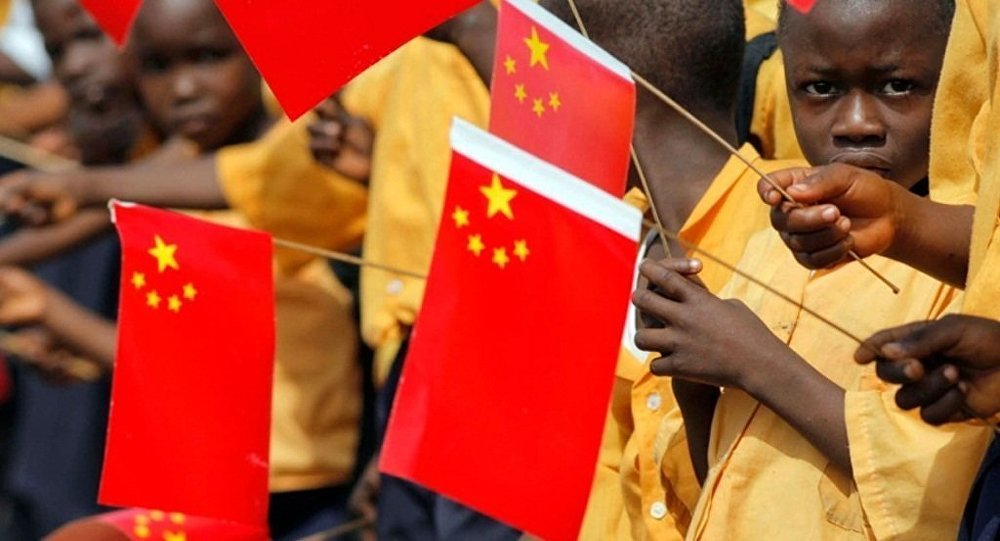This Book Will Tell Everything You Need to Know About China-Africa Relations
China's growing dealings with Africa over the past 70 years remains one of the most controversial international relations talking points of the 21st century. Its notoriety in part lies in the opaque nature of contracts signed between the world's second-largest economy and small African nations wanting to get a foothold on the international political stage.
On one hand, the Chinese government is quick to dismiss their interests in the continent as veiled neo-colonialism, a continuation of the failed and cataclysmic meddling of European powers which came to a head in the 1970s and '80s, and simply a way to get their hands on the huge stores of the continent's natural resources. They do so by pointing to their work in improving education, bringing wealth, and building infrastructure throughout the massive continent, including roads, schools, and hospitals. Naysayers, however, will just as quickly point to the sometimes questionable building quality of those projects as well as an unease among locals about the Chinese workers who are shipped in to build them, leaving Africans only to watch on without any fiscal reward.

It's no secret that both regions have greatly benefitted in many ways from the influx of agreements signed since the 1990s, which saw trade increase by 700 percent in that decade alone, as well as the establishment of the Forum on China-Africa Cooperation (FOCAC) in 2000. However, China's true intentions in Africa, as they are at home, remain difficult to decipher.
It is within this context that author and social entrepreneur Lina Getachew Ayenew, born in Ethiopia's capital Addis Ababa, has spent the past five years documenting China's emergence as a key player in Africa's economic development, distilling her findings into her new book The Complete Beginner's Guide to China-Africa Relations.
The book specifically focuses on the time span between 2014-2018, "a crucial period in this shared history," during which time China's Belt and Road Initiative was kickstarted, Africa welcomed an increasing number of Chinese tech advances, and China banned domestic ivory trade, among other milestones.
We talk to Ayenew about how she became interested in China-Africa relations as well as some of the specific findings outlined in her new book, themes that she will discuss in greater detail at her talk at The Bookworm on Feb 20.
How did you get involved in Africa-China relations?
I first moved to China in 2011 and I have been living here for a total of almost six years. I would go back to my hometown, Addis Ababa, Ethiopia, and see how much China's presence was transforming the city. The neighborhood near my parents' house, where I grew up, was morphing into a Chinese enclave that boasted several Chinese restaurants, supermarkets, KTV, and a vegetable market. This transformation was really intriguing to me and I told everyone about it. A company then commissioned me to write a research report about Africa-China relations, and that really motivated me to devour everything I saw about the subject... and that is how this book was actually conceived. I also wrote the first (and as of now, only) book in the world that teaches introductory Mandarin Chinese to Amharic speakers. So I guess I really felt compelled to share what I know and have learned while straddling two worlds.
What makes The Complete Beginner's Guide to China-Africa Relations worth reading?
It is unique in that it offers a bird's-eye view of what is happening between the continent and China and covers major themes that are often presented in this space. When I first began learning about China-Africa relations, it felt like drinking from a hose, and I yearned for something that just told me what I needed to know but with enough substance. I hope that this book helps students, journalists, authors, diplomats, and others who are interested in knowing more but who are not yet experts in the field.
What experiences did you draw upon while writing the book?
I first began compiling the "mega-themes" in China-Africa relations into a comprehensive report in 2014. I was commissioned by a company for this project but I kept doing it every year until 2018. This book is a compilation of these reports. I drew upon the work of leading researchers and reporters and made an effort to present a fair analysis of the issues at hand. Writing about such a vast subject matter can be difficult at times but there were a few things I did that really helped:
- Staying up-to-date by reading something every day about China-Africa relations, and keeping a running list of interesting themes on the "notes" app on my phone.
- Attending conferences when possible and at the very least, joining email lists and WeChat groups that act as a platform for like-minded individuals.
When it comes to writing, I am a sprinter and not a marathoner. So I just carved out a time (a few weeks a year), where I just wrote for a few hours a day about all the themes that I had collected on my "notes" app. It is really cool to see a random list on my phone spring into life in the form of a report and now, a book!
What is the biggest lesson about Sino-African relations that you'd like readers to know?
Like all relationships, the connection between China and Africa has both positive and negative facets. I say "like all relationships" because it is easy to forget in international relations that we are talking about relations between people or institutions made by people or decisions made by people. There are positive and negative aspects in the relationship between mother and child... forget about the relations between China and Africa, in which billions are involved.
So it is important to see the big picture... or as big a picture as we can. There is usually an impulse to concentrate only on the negative or only on the positive... and that kind of thinking may not paint a complete narrative. My hope is that the book helps shed light on all pertinent issues.
See Lina Getachew Ayenew speak at The Bookworm on Wednesday, Feb 20 at 7pm. Tickets cost RMB 60 and include one drink.
For further reading, dig into these five China-centric books.
Images: silvimedia.com, ft.com, The Bookworm







